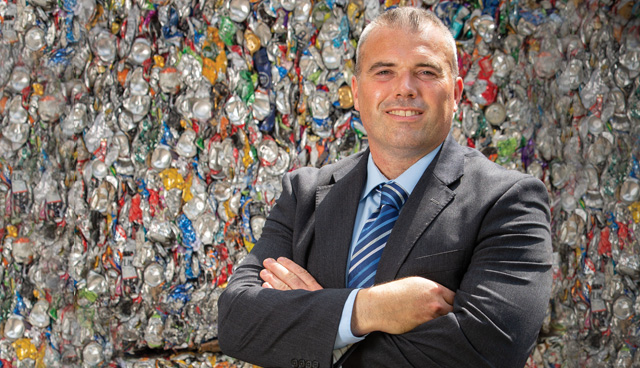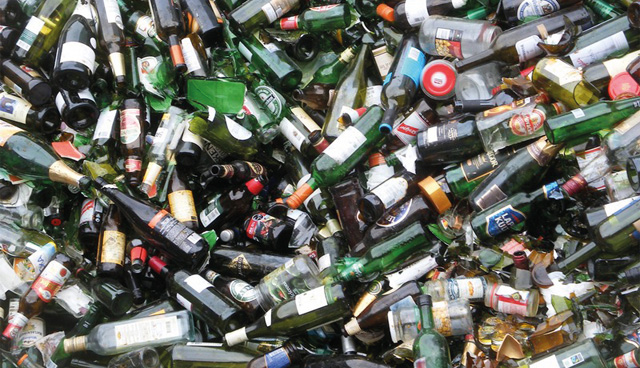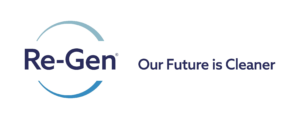Why innovation is the future for Northern Ireland’s waste

The COP26 conference in Glasgow has woken the world up to the importance of sustainability.
It has brought a sense of urgency to our need to act on climate change, to reduce carbon emissions and to ultimately arrest global warming so we have a chance of leaving the earth in a better place for the next generation.
It stands to reason that the waste sector provides a good place to enact change which will help us achieve those goals.
Whilst society continues to produce ever greater volumes of waste, the waste industry continues to find ways of reusing, recycling and recovering value from the waste produced.
Re-Gen Waste knows that first-hand, having been at the forefront of the drive to boost recycling here in Northern Ireland.
Since 2004, Re-Gen has been collecting household waste from throughout the province before sorting and recycling as much as possible at its Newry plant.
It has developed into one of Europe’s most advanced materials recovery facility (MRF) installations using best-in-class waste processing technologies to ensure the highest European standards are not only met, but regularly exceeded.
Re-Gen uses a combination of computer-controlled, mechanical and manual sorting processes to ensure it fully extracts all the recyclable commodities with minimal contamination.
“At Re-Gen, our vision since inception has been continual improvement in recycling across the UK and Ireland,” explains Joseph Doherty, Managing Director at Re-Gen Waste. “Our aim is to bring customers closer to zero landfill from residual waste. Our business is recycling and since 2004, we have diverted 1.8 million tons of waste from landfill. In addition, there are still recyclable materials finding their way into the residual waste stream and we want to address that.”
Crucially, the company’s focus is on continuous engineering development, driven by reinvestment of its profits driving innovation in its businesses.
“Each week we are seeing new technologies emerge which are helping companies like us to recycle more and more.”
That innovation, and indeed the adoption of new processes and techniques emerging from companies throughout the global waste sector, means each year Re-Gen is able to reduce the small fraction of waste which it isn’t able to recycle.
At present, that final fraction is sent for incineration to energy plants in Northern Europe, producing not just electricity, but also heat, supplied to homes and businesses via district heating systems, a much less carbon intensive process than building a waste incinerator in Northern Ireland where the excess heat from the process could not be economically used as we have no heat networks in our towns and cities.
Export provides the most environmentally friendly method of managing the non-recyclable part of Northern Ireland’s waste at present, but it will only be used as a short-term solution, one which will be phased out as future advancements in the technology used to recycle waste are developed.
Homegrown solutions
In fact, many of those technologies are already in existence, such as fully automated picking systems, optic sorters and robotics to maximise recovery and reduce contamination. Other exciting technologies are being developed to provide on shore recovery of valuable chemicals and, while not yet economically viable, it is expected that in the next few years innovation from Re-Gen and others will deliver homegrown solutions to homegrown waste issues.
As the technology progresses, Re-Gen will send less and less waste for energy recovery and aims to reuse all recoverable fractions of the waste it handles here in Northern Ireland. Policy will see an increase in and a redistribution of funding for the industry.
“The waste sector doesn’t stand still,” Doherty says. “Each week we are seeing new technologies emerge which are helping companies like us to recycle more and more.
“That is hugely exciting for us and for Northern Ireland because it means we are getting closer and closer to our end goal of being able to recycle all our waste. That will be a boost for Northern Ireland’s sustainability credentials and will speed us on the journey to net zero carbon and beyond.”
There is, however, a concern that reaching that goal may be pushed out of reach if an alternative proposal for handling the future of Northern Ireland’s waste is given the green light.
Arc21, a group of six councils, is proposing the construction of a £240 million incinerator near Mallusk as a solution to handle the province’s waste.
Re-Gen Waste is continually growing its business with plans to invest £20 million in developing products made from recycled wastepaper and glass, in a project which will create 120 jobs. It is also on track to develop a Circular Economy Resource Park near its Carnbane Business Park base in Newry, a move which will include manufacturing facilities for producing solid recovered fuel from waste and which will create 130 jobs and reduce the need for the energy recovery of waste materials.
However, using existing waste-to-energy technology, of the type proposed by arc21, requires a high-volume, guaranteed waste stream for at least 25 years to make them economically viable, potentially creating a mandate to prioritise the demands of the facility over the need to recycle.
In essence, as more materials are recycled, reducing the volumes in our black bins there is a strong likelihood that waste would have to be imported to Northern Ireland in the future to ensure the incinerator was fed.
The proposal would also stifle innovation in the sector.
“Our research indicates that this public sector proposal to provide a £240 million investment in a waste incinerator for the next 25 years, will tie the province into technologies that are already antiquated,” Doherty explains. “This stymies the chances of making meaningful reductions and could add to carbon emissions leaving the province, and ratepayers in the six council areas in the arc21 region, burdened with an expensive solution.”
Doherty believes arc21’s proposal will make Northern Ireland a laggard, not just in terms of its waste sector, but in its sustainability credentials.
“The choice is clear. Northern Ireland can opt for an already-outdated solution which will act as a drag on our ambitions to reach net zero carbon, snuff out any chance of innovation in the sector and necessitate the importation of waste, or we can opt for the future solutions which will accelerate the province’s route to net zero and beyond, encourage innovation and quickly allow us to recycle all Northern Ireland’s waste,” he adds.
In the wake of COP26, Re-Gen’s solution fits perfectly with the global movement towards an environmentally friendly, intelligent and workable way to handle waste in the future.
T: +44(0)28 3026 5432
E: info@regenwaste.com
W: www.regenwaste.com







